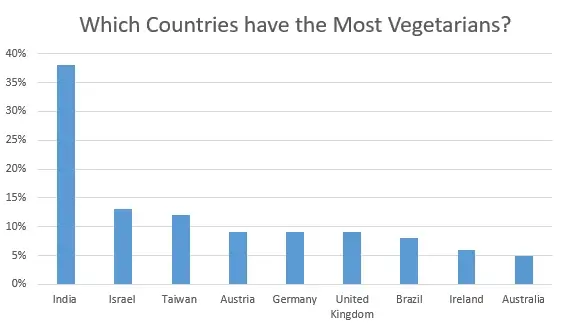Vegetarianism is becoming increasingly popular, and more people than ever are choosing to leave meat off their plates. This article will explore the statistics surrounding vegetarianism, looking at the percentage of world vegetarians, the health benefits of being vegetarian, and the environmental benefits of becoming a vegetarian.

What percentage of the world is vegetarian?
Vegetarianism has become increasingly popular in recent years, with more and more people choosing to forgo animal products in their diet. But how much of the world’s population is actually vegetarian? The answer isn’t as straightforward as it may seem. According to a recent study, only an estimated 10-12 percent of the global population currently follows a strictly vegetarian diet.
However, this number varies drastically depending on which country you look at. Some countries have much higher percentages than others; In India, for example, approximately 30-35 percent of the population practices some degree of vegetarianism due to cultural and religious beliefs.
Which Countries have the Most Vegetarians?

1. India (38%)
India has recently earned a place in the international spotlight for its outstandingly high rate of vegetarianism. According to studies, India has been found to have the highest number of vegetarians in the world, with an estimated 38% of its population abstaining from meat and fish consumption. This makes India far ahead of other countries such as Israel, Taiwan, and Germany.
The decision to follow a vegetarian lifestyle is deeply rooted in Indian culture and religion. Hinduism strongly recommends it as part of a moral life devoted to non-violence towards animals and nature, which many Indians take very seriously. Furthermore, vegetarian dishes form an important part of Indian cuisine due to the immense variety offered by plants such as pulses and grains – allowing for an incredible range of flavors not just limited to salads or vegan meals.
2. Israel (13%)
It is no secret that Israel has a large vegetarian population. In fact, an estimated 13% of the Israeli population are vegetarians. The trend toward plant-based diets has been growing in recent years in Israel, with more people turning away from animal-based foods in favor of meals centered around grains, legumes, fruits and vegetables. For example, vegan pita sandwiches filled with fresh tomatoes and cucumbers have become popular street food fare throughout the country. Vegetarian restaurants are also popping up everywhere, from Tel Aviv to Jerusalem to smaller villages. These restaurants offer a variety of dishes, from stuffed cabbage rolls to pumpkin kugel, as well as vegan cakes for dessert.
3. Taiwan (12%)
Vegetarianism is becoming increasingly popular in Taiwan, with over 12% of the population now following a plant-based diet. This percentage is higher than in many other countries and reflects the changing attitudes towards health, eco-friendly living, and animal welfare that have become increasingly important to Taiwanese people.
Taiwan has long been known for its abundance of delicious street food. However, there has been a shift recently to include more vegetarian options like veggie burgers, mushroom buns, and soybean milk. This is because of the increasing number of people choosing to follow either a vegetarian or vegan lifestyle for moral or health reasons. Moreover, some cities like Taipei even have their own dedicated vegan restaurants featuring entirely plant-based dishes.
Other statistics for vegetarians in other countries are as below:
- Austria (9%)
- Germany (9%)
- United Kingdom (9%)
- Brazil (8%)
- Ireland (6%)
- Australia (5%)
Which Gender is more Vegetarian?
Vegetarianism has become an increasingly popular lifestyle choice for many individuals. The debate over which gender is more likely to embrace a vegetarian diet has been ongoing for some time now. Recent studies suggest that the answer may not be as clear-cut as one might think.

Women are typically thought of as more likely to follow a vegetarian diet than men, with some research showing that females account for up to three times more vegetarians than their male counterparts. However, this is not always the case; in several countries, such as the United Kingdom, studies show that the number of vegetarian men is nearly equal to that of women. Additionally, researchers have found that although women are overall more likely to adopt a vegetarian diet than men, it tends to be younger generations who are most likely to become vegetarians regardless of gender.
Lower Risk of Cancer for Vegetarians
Recent research shows vegetarians may be at a lower risk of developing cancer. A study conducted by the London School of Hygiene and Tropical Medicine found that vegetarians were 12 percent less likely to develop cancer when compared with their non-vegetarian counterparts. This is likely due to the fact that vegetarians have lower levels of saturated fats in their diet, which can contribute to an increased risk for certain types of cancer.

The study examined over 61,000 participants over 18 years, finding vegetarians were at lower risk for colorectal and lung cancer in particular, as well as oral, stomach, esophageal, and breast cancer in general. The study also highlighted the potential benefits of reducing red meat consumption in favor of poultry or fish instead.
(LSHTM)
How many Lives can Vegetarians Save?
Vegetarianism is a lifestyle that has been gaining popularity for its numerous physical and mental health benefits. However, many people need to realize that vegetarianism can also be beneficial to the environment and animals around us. By becoming a vegetarian, an individual may improve their health and save countless animals’ lives.

Animals raised for food are subject to terrible cruelty with little protection or consideration for their well-being. The most significant benefit of becoming a vegetarian is saving the lives of these animals by reducing the demand for animal products such as eggs, dairy, and meat. It’s estimated that one person going vegan will save up to 365 animals per year – an incredible number when you consider how many vegetarians there are in the world today!
FAQs about Vegetarians Statistics
- Which Countries Have the Most Vegetarians?
1. India (38%) 2. Israel (13%) 3. Taiwan (12%) 4. Austria (9%) 5. Germany (9%) 6. United Kingdom (9%) 7. Brazil (8%) 8. Ireland (6%) 9.Australia (5%)
- How many lives can vegetarians save per year?
It’s estimated that one person going vegan will save up to 365 animals per year









